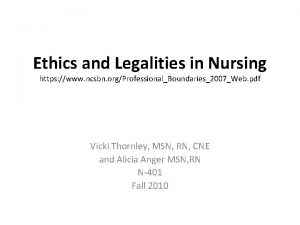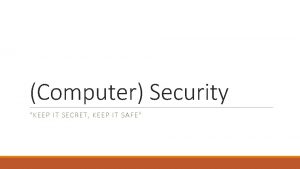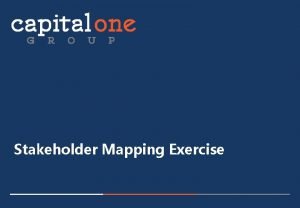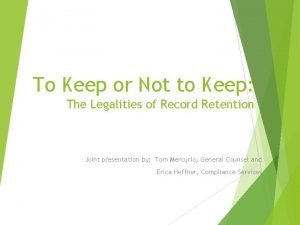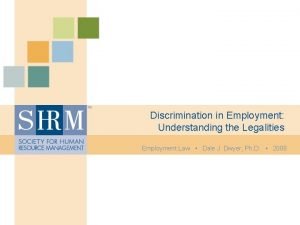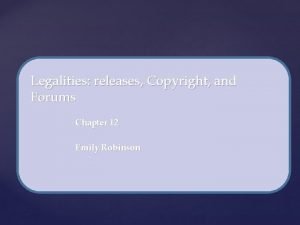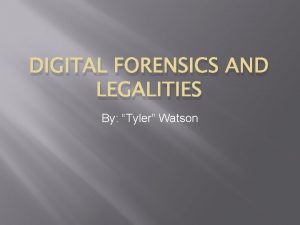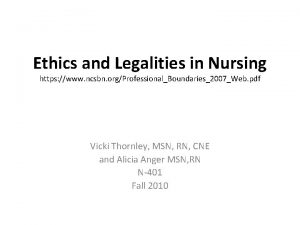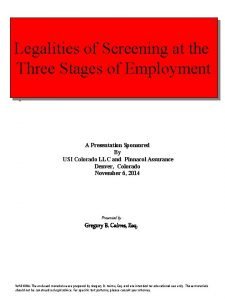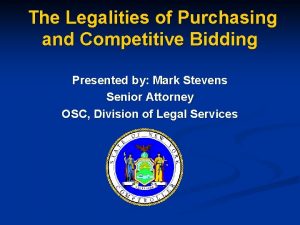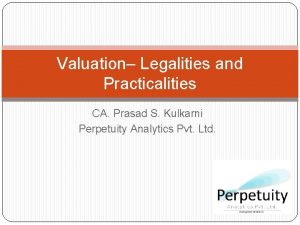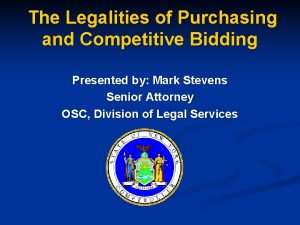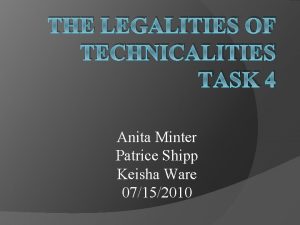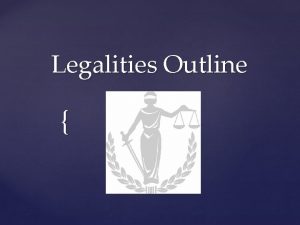To Keep or Not to Keep The Legalities

























- Slides: 25

To Keep or Not to Keep: The Legalities of Record Retention Joint presentation by: Tom Mercurio, General Counsel and Erica Heffner, Compliance Services

Overview • Importance of Records Management • What is a “Record” • Review of Policy and Records Schedule • Sources of Rules and about Preservation and Destruction • Duty to Destroy and how to do it right • Special Topics

Why is Records Management Important? Records are an information asset and hold value for UVM has a duty to stakeholders to manage records effectively UVM must comply with regulatory retention requirements Some records contain protected or proprietary information that should be protected

Who is responsible for managing records and information? Each employee that has creates or has access to University records has an important role to play in protecting the University by creating, using appropriately, retrieving and disposing of records in accordance with University policy. • Each employee should be familiar with the policy and know how to access the records retention schedule •

What are records? Records are the evidence of what an organization does. They capture the business activities and transactions, correspondence, personnel files. Records come in many formats, including paper, e-mail, databases, web content, and can reside on Smartphones, flash drives, laptops, and servers.

What are records? Records are things that (1) exist longer than it takes to create them, and (2) can be preserved and revisited later. Choices we make (consciously or not): to create a record; to preserve it; to destroy it Most records are “public” records under Vermont law; not all records are “official” or need to be preserved.

Policy Definition - Records: means any and all written or recorded matter produced or acquired in the course of University business, including without limitation all papers, documents, e-mail messages, machinereadable materials, and any other written or recorded matters, regardless of their physical form or characteristics.

Sources of Rules About Preservation and Destruction Rules imposed upon us by law or other authority Rules we fashion and impose on ourselves (and must obey!)

UVM Policy Statement http: //www. uvm. edu/~uvmppg/general_html/recordr etention. pdf Threefold policy statement (Create and maintain, Protect, Destroy): To preserve the integrity (maintain) of documents created or maintained in the course of institutional business, To secure sensitive information contained in University records, and To ensure that records that are no longer needed or have no value are discarded at the appropriate time.

Maintenance and Preservation of Records The Records Retention Schedules sets forth retention periods for University records (http: //www. uvm. edu/compliance/record_retention_s chedule) Periods are based on federal or state regulatory requirements, professional association guidance and management needs Schedule is updated as requirements change, refer to the posted schedule for most current version

Common Departmental Retention Requirements The following records are common to most all departments: Employment files not in Human Resources ( Conflict of Interest Disclosure Forms – for non-officers Timesheets and supporting documentation (not kept in Peoplesoft) Employment applications and interview notes Contracts Journal Entry Support Interdepartmental billing records Budget Change Orders Support Detail (if not entered into Peoplesoft) Sponsored research data

Terminology for Retention Periods are in years unless otherwise noted ACT- active, employed or enrolled LIFE - life of affected employee (usually pertains to HR records) AFYE- After fiscal year end *Unless otherwise noted retention begins from date record created

Duty to Secure Sensitive Information Records containing protected personal data or sensitive university information as defined by UVM’s Information Security and Privacy policies require sufficient protection to prevent unauthorized disclosure of this information. Unauthorized disclosures may impose further reporting obligations as well as put those whose information has been compromised at risk.

Duty to Secure (cont. ) Records containing personal information should be secured to prevent unauthorized disclosure. Accidental public disclosure of personal information requires reporting and disclosure in accordance state and federal laws. Social Security numbers, in particular, should not be used except where required by law. Other records that may trigger reporting obligations include credit card numbers, bank or financial account numbers, driver’s license numbers and some health records. Student education records are confidential and protected under FERPA. These records should only be shared on a need to know basis. Suspected unauthorized disclosures of protected personal information should be reported to ISO@uvm. edu or 866 -236 -5752

Duty to Destroy - Record Disposal When records have reached the end of their retention period they should be discarded or destroyed. Any records containing personal or sensitive University information should be destroyed by either shredding, erasing or otherwise modifying personal information make it unreadable or indecipherable. Risks of keeping records longer than necessary include storage costs and potential legal discovery during legal proceedings or regulatory audits. Once an audit has begun or a lawsuit is anticipated, relevant records can no longer be destroyed even if their retention period has been exceeded.

Legal Reference - Document Destruction VT Act 162 Document Safe Destruction Act An organization shall take all reasonable steps to destroy or arrange destruction of a customer’s records when those records contain personal information which is no longer to be retained by the business.

Record Disposal- Resources Procurement has arranged a pricing agreement with Secur. Shred for favorable rates on paper and tape destruction. Secure. Shred (802)863 -3003 phone ext. 6 Contact: David Van Mullen http: //www. securshred. com/ Special consideration should be given when disposing of computers or other technology that may hold data (including personal information) CD’s, zip drives, thumb drives, smartphones, etc. These items should be erased of any data before disposal and then disposed of properly through University recycling. Disposal resources include: ü Disposal of Surplus Computers http: //www. uvm. edu/techteam/computer-disposal/

Special Considerations Electronic Records Electronic records require technology to access. Considerations include: Ability to access over life of record requires planning for potentially obsolete technology and conversion needs Maintaining the security and integrity of the records to prevent alterations, unauthorized access and having adequate disaster recovery plans Ability to destroy records that exceed their retention period

Special Considerations - Email is just another format a record may take. Records may be kept in email format as long as all the other retention requirements for records, including electronic records are kept. Email that is not required to be kept per our records policy and schedule should disposed when no longer needed for administrative purposes. Employees should not transmit protected personal information via email. Secure file transfer should be used to transmit records containing sensitive information.

Special Considerations – Archival Records documenting UVM’s history, strategic decisions, organizational changes as well as some official publications may be archival records. If you feel a unique record may hold archival value, contact the University Archivist prior to disposing.

Litigation Holds • When NOT to destroy: 1. Pending or anticipated litigation 2. External investigation 3. Internal audit or investigation 4. Pending request to see a record

Public Records Request All requests for UVM records not made as part of routine business processes should follow the Records and Documents Request Policy (http: //www. uvm. edu/~uvmppg/general_html/rec ord_request. pdf) Time considerations apply under the Vermont Public Records Act, so prompt response is needed. Requests should be made in writing All requests go through the Vice President of Executive Operations

FERPA/HIPAA FERPA Rights Disclosure Policy http: //www. uvm. edu/~uvmppg/ppg /student/ferpa. pdf Addresses students rights to access to their educational records Students have legal expectation that their education records kept confidential, however, does not prevent communicating student information to UVM faculty and staff with legitimate need to know basis. HIPAA UVM hybrid entity, only those covered components are subject to HIPAA privacy requirements http: //www. uvm. edu/~comp lian/Privacy/? Page=HIPAA. ht ml&SM=select_topics_submen u. html

Take Aways Know the three duties: maintain, protect, and destroy Understand different requirements for different record formats(i. e. paper, electronic) Understand how to protect personal information Know when NOT to destroy records How to respond to a request for information Resources: UVM Policy Page Record Retention Schedule

Wrap -up Questions? Email Compliance@uvm. edu Phone: Compliance Services 802 -656 -3086
 Unified products and services tarpaulin
Unified products and services tarpaulin Satvital
Satvital Difference between law and ethic
Difference between law and ethic Keep it secret keep it safe
Keep it secret keep it safe Stakeholder mapping exercise
Stakeholder mapping exercise Keep satisfied manage closely monitor keep informed
Keep satisfied manage closely monitor keep informed English 9 vocabulary unit 1
English 9 vocabulary unit 1 Keep your eye on the donut not the hole
Keep your eye on the donut not the hole Từ ngữ thể hiện lòng nhân hậu
Từ ngữ thể hiện lòng nhân hậu Chó sói
Chó sói Diễn thế sinh thái là
Diễn thế sinh thái là Thể thơ truyền thống
Thể thơ truyền thống Thứ tự các dấu thăng giáng ở hóa biểu
Thứ tự các dấu thăng giáng ở hóa biểu Các châu lục và đại dương trên thế giới
Các châu lục và đại dương trên thế giới Lời thề hippocrates
Lời thề hippocrates Khi nào hổ con có thể sống độc lập
Khi nào hổ con có thể sống độc lập đại từ thay thế
đại từ thay thế Vẽ hình chiếu vuông góc của vật thể sau
Vẽ hình chiếu vuông góc của vật thể sau Lp html
Lp html Làm thế nào để 102-1=99
Làm thế nào để 102-1=99 Thế nào là mạng điện lắp đặt kiểu nổi
Thế nào là mạng điện lắp đặt kiểu nổi Thang điểm glasgow
Thang điểm glasgow Các loại đột biến cấu trúc nhiễm sắc thể
Các loại đột biến cấu trúc nhiễm sắc thể Quá trình desamine hóa có thể tạo ra
Quá trình desamine hóa có thể tạo ra Vẽ hình chiếu đứng bằng cạnh của vật thể
Vẽ hình chiếu đứng bằng cạnh của vật thể Công thức tính thế năng
Công thức tính thế năng


